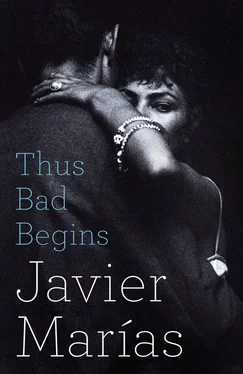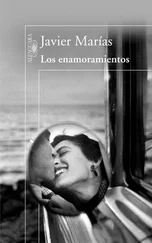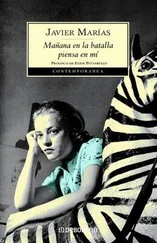I paid the driver and got out on my side. The taxi moved off, vanished in a second, leaving the two of us alone in the diminutive Calle Watteau, separated by the space previously occupied by the car. I didn’t notice the building or the door or anything, I can remember nothing of that. I only had eyes for Celia, who, for the first time in a long while, I was able to study from that short distance, all of her, including her high heels, which she had not for a moment taken off. Her skirt had ridden up slightly and grown creased during the journey. She held out her hand to me, then changed her mind and linked arms instead, and together we walked over to the street door. It was probably something of an event for her too, coming home with a young man. No, I didn’t really believe that, she could have made off with as many young men as she wanted, some are impatient and eager, others timid and grateful and others insatiable. I doubtless belonged a little to all three categories. I couldn’t help looking at us for a moment with the eyes of a spectator or a collector, with the eyes of the imagination, which are the eyes that best remember a scene and best recall it later. I couldn’t help thinking that if Dr Van Vechten had seen us, he would have added another notch to my gun and would have felt rather proud of me. And hated me too.
But I didn’t know then that nothing heals over time, nothing abates, nor that we can become lazier or more cautious, that we won’t necessarily pay more heed to private loyalties, which act as a filter, guide and brake, and I had plenty of examples to prove this was the case for many people, mature adults who never give up and who are always insatiable and restless, at least mentally, I mean: it’s as if they had to keep going merely in order to satisfy a tyrannical mind that never rests and never stops, having grown too accustomed to its own way of being for far too many years — youth and maturity are very long and the frontiers that mark their end very vague — independent of the needs and vicissitudes and capacities of their body, which they increasingly see as an annoying tool from which they have to demand ever greater efforts; too accustomed, as well, to carrying out certain habitual calculations — how many different women have I been to bed with this year, for example; how many didn’t I pay for — who will be the next man to fill this void, for example; I only need one more, then I’ll stick with him and ask no more questions. (Just as there are older people who seem to soften and become inoffensive, and whose indecipherable or fickle or absent minds — it’s impossible to know what someone else is thinking — are perhaps ceaselessly plotting vile deeds and accumulating ill will towards everyone around them. It is our deceived minds that never surrender, that feel the same as they always did and see no reason to change. And if they do ever look back with the advantage of distance, it is only to think: ‘My guilt has passed. The years have diluted it, I’ve been washed clean. I can start counting again, even if I’ll only be counting further guilty acts. It will be new, different, and shorter, because I don’t have so much time now.’)
I could see that Beatriz had not given up counting, at least that seemed to me to be the point of those afternoon visits, even though from the outside they appeared banal and routine and in no way hopeful, even though she knew that basically, for her, the next man was the one she had always and only wanted, the one she had been with for longest and whom she still did not rule out (‘You’re the only one I’m interested in, you’re the only one I love, surely I don’t need to tell you that, however hard you try to drive me away’), but who had grown bitter and vengeful. When he was in a bad mood or had met with one too many setbacks in his dealings with Towers, Muriel didn’t only call her a ‘fat cow’ or a ‘bag of flour’, a ‘pachyderm’, ‘a lump of lard’ or ‘a ball of flab’, he didn’t only compare her to the big bell at El Alamo or to the stagecoach in Stagecoach or suggest that she resembled Shelley Winters at her plumpest or ‘Baudelaire’s Giantess’ (an allusion that escaped me at the time), he also compared her to obese actors (‘Stick a moustache on you and you’d look just like Oliver Hardy’ or ‘I hope you don’t start going thin on top, otherwise you could be mistaken for Zero Mostel, you remember him, don’t you, he was our friend Jack Palance’s sweaty sidekick’), knowing that she would know all the cinematographic references, far better than me. His insults were so unjustified and disproportionate, so ludicrous and ill-intentioned and absurd — almost comic — that perhaps, for that reason, she found them less wounding — they may even have made her laugh, somewhere deep inside — although they must also have been very hard to take, must have undermined her self-esteem and created a terrible sense of insecurity. I often wondered why she didn’t just fade away and give up her nocturnal expeditions to her husband’s bedroom door, perhaps what helped her recover from these rejections and to pluck up courage were her encounters with Van Vechten in that ultra-religious context and in the purely secular context of Plaza del Marqués de Salamanca with whoever it was she visited there (because both those visits were repeated), and possibly with someone else in El Escorial or wherever else she drove to on her motorbike. And perhaps she sensed what she could not know, but that I did, that while Muriel would happily throw these insults in her face, he would never refer to her in such terms in her absence, I mean, he never spoke of Beatriz in another person’s presence as ‘a cask of amontillado’ or as Charles Laughton, but always as ‘Beatriz’ or ‘my wife’ to third parties, and as ‘Mama’ or ‘your mother’ to the children and ‘Señora Beatriz’ or simply ‘Beatriz’ to Flavia, and he took great pains to make sure there were no witnesses around when he addressed her in that distasteful manner, this included myself, in theory, although he did let slip the occasional abusive phrase in my presence (I became as invisible as the air), but I also did my own bit of spying and heard things I shouldn’t have heard. Anyway, the fact that he refrained from reviling her so brutally when other people were present seemed to me a very feeble show of respect, or perhaps a feeble remnant of the affection he must have felt for her in prehistory.
Nor did I see Muriel, who was approaching or already in his fifties, relenting in his pursuit of women, if ‘pursuit’ is the right word. He never seemed to be urgently pursuing anyone, he appeared, rather, distracted, at least in that regard, and adopted a negligent, contemplative attitude. He appeared surprised when he discovered he was being lusted after by some beautiful young upstart or by some more upmarket seductress. On those occasions, however, he never paused to wonder if his suitors wanted something from him — a minor role in a film or the mere allure of his name — nor did he drive them away when this became obvious. He allowed himself to be led and manipulated, or so it seemed, but afterwards would appear indifferent and stoical or wouldn’t even remember — indeed he sometimes said as much, and I’ve already mentioned one such case — having shared a bed with someone who would have liked to have made further visits to his bed — with him inside it of course — or had dared to demand a small favour. Since he had offered nothing, he felt under no obligation, it was up to them what they did, but he certainly hadn’t encouraged them. I never saw him seriously ‘paired up’ with any woman, at most he would go out with the same woman several times if he got on well with her and liked her, usually just as a companion at premieres or cocktail parties, at superficial and usually group outings with other people, I thought he would probably get bored having supper with any of them alone, or having to engage in conversation with them after those occasional rolls in the hay, which I imagined would be rather mechanical, more medicinal than sexual and certainly not passionate. I’m sure he found tedious the young and not-so-young, be they upstarts or aristocrats, who had never heard of Zero Mostel or Andy Devine or Eugene Pallette or Sydney Greenstreet, to mention other overweight actors to whom, on his angry or overly jocular days, he might have compared Beatriz, nor would they have heard of Baudelaire, with or without his giantess. On the other hand, with those women he genuinely admired or found interesting or fascinating, like Cecilia Alemany, not only were they few and far between, he didn’t usually stand much chance, for they belonged to other worlds where he was just a pauper at the gate or, at best, an intriguing artist who might bring a little sparkle or glamour to the supper table. And perhaps he allowed himself to praise them and tell them he adored them precisely because they were mere chimera. It sometimes occurred to me that Muriel would probably have had one or two or three women in his life, to whom he would have given himself unreservedly, but who were so important and intelligent, so fine, that he found it hard to take seriously almost any other woman who approached him. I was convinced that one of those two or three — if there had been two or three — would have been the Beatriz of earlier days, the one who had lived in America and whom he had married, the willing, optimistic, cheerful Beatriz who was still there, the Beatriz who had not yet gone half-mad, who was not yet utterly wretched. Or, how can I put it, cast adrift.
Читать дальше












